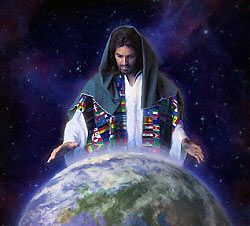All the ends of the earth have seen the salvation of our God. (Psalm 98:3b)
 God could have done a quiet work of salvation, He did after all, chose a small, even insignificant, people, in a remote part of the planet. They had many huge and notable empires nearby: Egyptians, Babylonians, Persians, Greeks, Romans, etc. But there was tiny Israel, always with another conqueror breezing through, and making them a (remote and inconsequential) part of an “intergalactic” empire. But one of the reasons God chose a small people was to ensure that they would never (try though they must) get the credit for their salvation. This salvation was very much a God-thing, and must not be confused for anything else. So when All the ends of the earth have seen the salvation of our God, they were seeing the salvation of our God.
God could have done a quiet work of salvation, He did after all, chose a small, even insignificant, people, in a remote part of the planet. They had many huge and notable empires nearby: Egyptians, Babylonians, Persians, Greeks, Romans, etc. But there was tiny Israel, always with another conqueror breezing through, and making them a (remote and inconsequential) part of an “intergalactic” empire. But one of the reasons God chose a small people was to ensure that they would never (try though they must) get the credit for their salvation. This salvation was very much a God-thing, and must not be confused for anything else. So when All the ends of the earth have seen the salvation of our God, they were seeing the salvation of our God.
Now the question needs to be asked: Why? If this was an “Israel only” to-do, why should all the earth see it.
Well, Israel may have been God’s Chosen people, but all earth’s peoples were made by Him—all had His image stamped upon them.
There were those who were aliens who would recognize that the God of Israel was indeed the Lord of all. In the context of this Psalm, it was because they had seen the salvation of our God.
The stranger who resides with you shall be to you as the native among you, and you shall love him as yourself, for you were aliens in the land of Egypt; I am the LORD your God. ( Lev 19:34)
So show your love for the alien, for you were aliens in the land of Egypt. (Deuteronomy 10:19)
God had spoken to Israel on many occasions, reminding them they too were aliens; Perhaps the greatest thing about the New Covenant—all of us aliens can now draw close to the Lord God through the shed blood of Jesus.
But now in Christ Jesus you who formerly were far off have been brought near by the blood of Christ. (Ephesians 2:13)
After all, We have an Advocate with the Father, Jesus Christ the righteous; and He Himself is the propitiation for our sins; and not for ours only, but also for those of the whole world. (1 John 2:2)



 One thing. This is a very unifying approach to life, to faith—to whatever. The Hebrew text could actually say: One one I have asked. It may sound redundant, but think about it. Life is filled with one things that we must do, that need our attention. But what is the one One? Or should I say, Who is the only One. Four areas of your life will be changed forever by making the Lord, The One: Priority, Perspective, Purpose, and Practice.
One thing. This is a very unifying approach to life, to faith—to whatever. The Hebrew text could actually say: One one I have asked. It may sound redundant, but think about it. Life is filled with one things that we must do, that need our attention. But what is the one One? Or should I say, Who is the only One. Four areas of your life will be changed forever by making the Lord, The One: Priority, Perspective, Purpose, and Practice. One thing. This is a very unifying approach to life, to faith—to whatever. The Hebrew text could actually say: One one I have asked. It may sound redundant, but think about it. Life is filled with one things that we must do, that need our attention. But what is the one One? Or should I say, Who is the only One. Four areas of your life will be changed forever by making the Lord, The One: Priority, Perspective, Purpose, and Practice.
One thing. This is a very unifying approach to life, to faith—to whatever. The Hebrew text could actually say: One one I have asked. It may sound redundant, but think about it. Life is filled with one things that we must do, that need our attention. But what is the one One? Or should I say, Who is the only One. Four areas of your life will be changed forever by making the Lord, The One: Priority, Perspective, Purpose, and Practice. One thing. This is a very unifying approach to life, to faith—to whatever. The Hebrew text could actually say: One one I have asked. It may sound redundant, but think about it. Life is filled with one things that we must do, that need our attention. But what is the one One? Or should I say, Who is the only One. Four areas of your life will be changed forever by making the Lord, The One: Priority, Perspective, Purpose, and Practice.
One thing. This is a very unifying approach to life, to faith—to whatever. The Hebrew text could actually say: One one I have asked. It may sound redundant, but think about it. Life is filled with one things that we must do, that need our attention. But what is the one One? Or should I say, Who is the only One. Four areas of your life will be changed forever by making the Lord, The One: Priority, Perspective, Purpose, and Practice. Out of all the myriad of choices that one can make, there really is only one. When all of our excuses, questions, posings, musings, debates, and complaints are exhausted, we are left with one inescapable truth: there is none other to whom we can turn; none other who can deliver and protect us; none other who can love and care for us; for You alone are God. (Nehemiah 9:6) And to deny this places our eternal soul in peril, and places us in opposition to God, rather than in His care.
Out of all the myriad of choices that one can make, there really is only one. When all of our excuses, questions, posings, musings, debates, and complaints are exhausted, we are left with one inescapable truth: there is none other to whom we can turn; none other who can deliver and protect us; none other who can love and care for us; for You alone are God. (Nehemiah 9:6) And to deny this places our eternal soul in peril, and places us in opposition to God, rather than in His care. For us to keep the word of the Lord requires commitment, it requires the heart as well as the mind; is that not the nature of obedience? Two verses to put this into the proper context:
For us to keep the word of the Lord requires commitment, it requires the heart as well as the mind; is that not the nature of obedience? Two verses to put this into the proper context:
